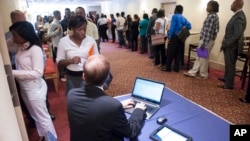WASHINGTON —
The U.S. unemployment rate is expected to improve slightly when the government releases new data on Friday. Economists tell the Bloomberg financial news service that the jobless rate will probably fall one-tenth of a percent to 7.5 percent, while the economy will have a net gain of 165,000 jobs. While the U.S. unemployment rate is better than it was during the financial crisis, it is still high in comparison to the average rate over the past couple of decades.
Researchers are seeking reasons for the slow job market recovery.
Economists and others say fast-changing technology and a mis-match between workers' skills and employers' needs get some of the blame for the frustratingly slow recovery in the U.S. job market.
With that in mind, researchers at the ACT company have been evaluating millions of workers over five years to see if they have key skills employers want -- applied mathematics, reading for information, and finding and analyzing information.
They found that people with more education tended to do better on the tests, but ACT's Hope Clark said higher education did not guarantee high levels of skill. She said many applicants struggled with tests of their ability to locate information and organize it in ways that are useful in the workplace, such as charts and graphs.
“If our nation does a better job of understanding the skills and requirements for jobs that are demanded by employers, we can do a much better job of making sure that our existing workforce and our future workforce have those skills that employers are looking for,” said Clark.
ACT is well known for testing prospective college students to see if they are ready for university-level work.
Meantime, some researchers at the Massachusetts Institute of Technology say impressive advances in computer technology may be the cause of sluggish employment growth for the past 10 or 15 years.
Past technological surges have destroyed some jobs, changed the nature of work, but eventually created more and often better jobs.
MIT's David Rotman, who monitors the university's research, said studies showed this time may be different with a net loss in the job market. Computers have been taking jobs in manufacturing, clerical, and retail work, and improved machines and software may expand into law, financial services, education and medicine.
“So one scenario is that machines will increasingly do a very broad range of jobs and tasks, and the pace of technology deployment and progress will continue to accelerate," he said.
Rotman is the editor of MIT's Technology Review, and said some scholars thought the nature of work was changing, with middle class jobs in the post office and customer service, for example, going away, while highly-paid work creating high technology grows, and hard-to-automate low-wage jobs in the service sector expand.
Researchers are seeking reasons for the slow job market recovery.
Economists and others say fast-changing technology and a mis-match between workers' skills and employers' needs get some of the blame for the frustratingly slow recovery in the U.S. job market.
With that in mind, researchers at the ACT company have been evaluating millions of workers over five years to see if they have key skills employers want -- applied mathematics, reading for information, and finding and analyzing information.
They found that people with more education tended to do better on the tests, but ACT's Hope Clark said higher education did not guarantee high levels of skill. She said many applicants struggled with tests of their ability to locate information and organize it in ways that are useful in the workplace, such as charts and graphs.
“If our nation does a better job of understanding the skills and requirements for jobs that are demanded by employers, we can do a much better job of making sure that our existing workforce and our future workforce have those skills that employers are looking for,” said Clark.
ACT is well known for testing prospective college students to see if they are ready for university-level work.
Meantime, some researchers at the Massachusetts Institute of Technology say impressive advances in computer technology may be the cause of sluggish employment growth for the past 10 or 15 years.
Past technological surges have destroyed some jobs, changed the nature of work, but eventually created more and often better jobs.
MIT's David Rotman, who monitors the university's research, said studies showed this time may be different with a net loss in the job market. Computers have been taking jobs in manufacturing, clerical, and retail work, and improved machines and software may expand into law, financial services, education and medicine.
“So one scenario is that machines will increasingly do a very broad range of jobs and tasks, and the pace of technology deployment and progress will continue to accelerate," he said.
Rotman is the editor of MIT's Technology Review, and said some scholars thought the nature of work was changing, with middle class jobs in the post office and customer service, for example, going away, while highly-paid work creating high technology grows, and hard-to-automate low-wage jobs in the service sector expand.





